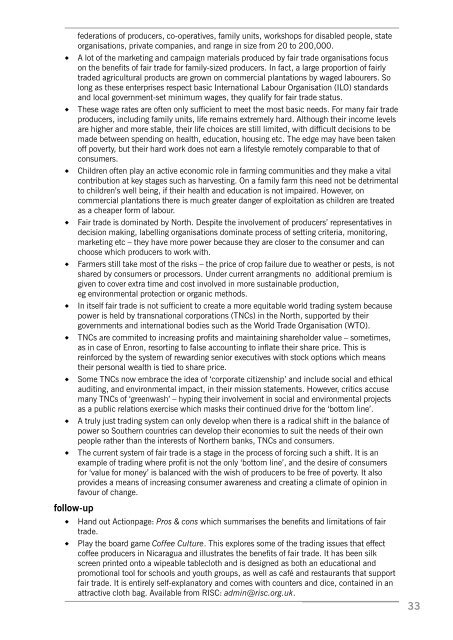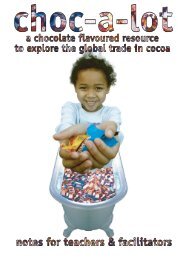Cost of coffee.indd - RISC
Cost of coffee.indd - RISC
Cost of coffee.indd - RISC
Create successful ePaper yourself
Turn your PDF publications into a flip-book with our unique Google optimized e-Paper software.
federations <strong>of</strong> producers, co-operatives, family units, workshops for disabled people, state<br />
organisations, private companies, and range in size from 20 to 200,000.<br />
◆ A lot <strong>of</strong> the marketing and campaign materials produced by fair trade organisations focus<br />
on the benefits <strong>of</strong> fair trade for family-sized producers. In fact, a large proportion <strong>of</strong> fairly<br />
traded agricultural products are grown on commercial plantations by waged labourers. So<br />
long as these enterprises respect basic International Labour Organisation (ILO) standards<br />
and local government-set minimum wages, they qualify for fair trade status.<br />
◆ These wage rates are <strong>of</strong>ten only sufficient to meet the most basic needs. For many fair trade<br />
producers, including family units, life remains extremely hard. Although their income levels<br />
are higher and more stable, their life choices are still limited, with difficult decisions to be<br />
made between spending on health, education, housing etc. The edge may have been taken<br />
<strong>of</strong>f poverty, but their hard work does not earn a lifestyle remotely comparable to that <strong>of</strong><br />
consumers.<br />
◆ Children <strong>of</strong>ten play an active economic role in farming communities and they make a vital<br />
contribution at key stages such as harvesting. On a family farm this need not be detrimental<br />
to children’s well being, if their health and education is not impaired. However, on<br />
commercial plantations there is much greater danger <strong>of</strong> exploitation as children are treated<br />
as a cheaper form <strong>of</strong> labour.<br />
◆ Fair trade is dominated by North. Despite the involvement <strong>of</strong> producers’ representatives in<br />
decision making, labelling organisations dominate process <strong>of</strong> setting criteria, monitoring,<br />
marketing etc – they have more power because they are closer to the consumer and can<br />
choose which producers to work with.<br />
◆ Farmers still take most <strong>of</strong> the risks – the price <strong>of</strong> crop failure due to weather or pests, is not<br />
shared by consumers or processors. Under current arrangments no additional premium is<br />
given to cover extra time and cost involved in more sustainable production,<br />
eg environmental protection or organic methods.<br />
◆ In itself fair trade is not sufficient to create a more equitable world trading system because<br />
power is held by transnational corporations (TNCs) in the North, supported by their<br />
governments and international bodies such as the World Trade Organisation (WTO).<br />
◆ TNCs are commited to increasing pr<strong>of</strong>its and maintaining shareholder value – sometimes,<br />
as in case <strong>of</strong> Enron, resorting to false accounting to inflate their share price. This is<br />
reinforced by the system <strong>of</strong> rewarding senior executives with stock options which means<br />
their personal wealth is tied to share price.<br />
◆ Some TNCs now embrace the idea <strong>of</strong> ‘corporate citizenship’ and include social and ethical<br />
auditing, and environmental impact, in their mission statements. However, critics accuse<br />
many TNCs <strong>of</strong> ‘greenwash’ – hyping their involvement in social and environmental projects<br />
as a public relations exercise which masks their continued drive for the ‘bottom line’.<br />
◆ A truly just trading system can only develop when there is a radical shift in the balance <strong>of</strong><br />
power so Southern countries can develop their economies to suit the needs <strong>of</strong> their own<br />
people rather than the interests <strong>of</strong> Northern banks, TNCs and consumers.<br />
◆ The current system <strong>of</strong> fair trade is a stage in the process <strong>of</strong> forcing such a shift. It is an<br />
example <strong>of</strong> trading where pr<strong>of</strong>it is not the only ‘bottom line’, and the desire <strong>of</strong> consumers<br />
for ‘value for money’ is balanced with the wish <strong>of</strong> producers to be free <strong>of</strong> poverty. It also<br />
provides a means <strong>of</strong> increasing consumer awareness and creating a climate <strong>of</strong> opinion in<br />
favour <strong>of</strong> change.<br />
follow-up<br />
◆ Hand out Actionpage: Pros & cons which summarises the benefits and limitations <strong>of</strong> fair<br />
trade.<br />
◆ Play the board game C<strong>of</strong>fee Culture. This explores some <strong>of</strong> the trading issues that effect<br />
c<strong>of</strong>fee producers in Nicaragua and illustrates the benefits <strong>of</strong> fair trade. It has been silk<br />
screen printed onto a wipeable tablecloth and is designed as both an educational and<br />
promotional tool for schools and youth groups, as well as café and restaurants that support<br />
fair trade. It is entirely self-explanatory and comes with counters and dice, contained in an<br />
attractive cloth bag. Available from <strong>RISC</strong>: admin@risc.org.uk.<br />
33




